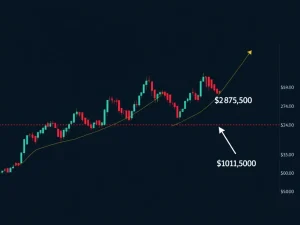Blockchain Football Transfers: Revolutionizing the Sport’s Financial Landscape

Football, the world’s most popular sport, captivates billions. Its global appeal, however, often masks a complex and often inefficient financial backbone, particularly within its critical transfer market. Delays, high costs, and opaque deals plague the current system. Yet, a powerful solution is emerging from the digital realm: **blockchain football transfers**. This innovative technology promises to transform the entire **football transfer system**, offering unparalleled speed, transparency, and efficiency for clubs worldwide. As Przemysław Kral, CEO of zondacrypto, suggests, the time has come for football to fully embrace this digital revolution.
The Current State of Football Transfer System Challenges
The football transfer market traditionally operates through discrete backroom deals and intricate negotiations. This process, while exciting for fans anticipating new signings, often presents significant hurdles for clubs. They face immense capital requirements and tight deadlines. Moreover, the existing **football transfer system** is notorious for its bureaucratic delays. These can severely impact a club’s ability to prepare for an upcoming season. Clubs frequently encounter issues that complicate player acquisitions, making the entire process cumbersome and stressful.
Delays and Bureaucracy: A Costly Game
Bureaucratic hurdles and slow settlement times are major pain points in the traditional transfer process. Consider the infamous 2015 incident: a faulty fax machine reportedly thwarted former Manchester United goalkeeper David De Gea’s move to Real Madrid. This anecdote, while almost comical, highlights a serious underlying vulnerability. Cross-border payments, especially between teams in different countries, can take days or even weeks to settle. Such delays create bottlenecks. They can easily hinder a transfer or cause clubs to miss crucial deadlines. Ultimately, these inefficiencies lead to increased costs and missed opportunities, particularly for smaller clubs with fewer resources.
How Blockchain Football Transfers Offer a Breakthrough
Blockchain technology offers a compelling alternative to these entrenched problems. Its inherent design allows for faster, more secure, and transparent transactions. This makes it an ideal candidate for streamlining the complex world of football transfers. Indeed, football has already begun to embrace the crypto industry. A rapid increase in **crypto football sponsorship** deals demonstrates this trend. SportQuake reports that football clubs account for 43% of all crypto sports sponsorships in the last year, valued at roughly $213 million. This existing partnership provides a solid foundation for deeper integration.
Pioneering Crypto Football Sponsorship and Payments
The integration of blockchain is not merely theoretical; it has already shown practical success. In 2018, cryptocurrency facilitated a transfer for the first time when Ömer Faruk Kiroğlu joined Harunustaspor, with a portion of his fee paid in Bitcoin. Since then, several major clubs, including Inter de Madrid, São Paulo FC, and Raków Częstochowa, have completed transfers using cryptocurrencies. These transactions consistently delivered reduced settlement times. They also bypassed numerous cross-border payment complexities that could otherwise stall deals. The development of more efficient and regulated crypto-native payment rails further simplifies this process. Moreover, governing bodies like UEFA could leverage these regulated rails. This would automate the release of performance-based rewards, for instance, when clubs qualify for the Champions League.
Overcoming Turbulent Markets with Digital Assets
Player transfers demand substantial capital. Initial fees and add-ons often reach multi-million-dollar figures. Furthermore, settlement and transaction fees for cross-border payments add to the burden. Lower league clubs frequently struggle with access to the global market because of these financial pressures. Economic volatility in certain regions exacerbates this challenge. Blockchain technology, particularly through stablecoins, offers a robust solution for maintaining value amidst such turbulence. This ensures financial stability during critical transactions, benefiting all participants.
Streamlining Cross-Border Payments Crypto Solutions
An early example vividly illustrates this potential. São Paulo FC aimed to acquire Giuliano Galoppo from Argentine side Banfield Athletic Club. However, the sale faced significant trouble due to the turbulent Argentine FX market. São Paulo FC strategically used stablecoins to complete the transfer, valued between $6 and $8 million in USDC. While Argentine export regulations later complicated the specific advantage gained, the case highlights blockchain’s power. It can provide a fixed and reliable value. This stability is crucial amid volatile financial markets. As the global economic landscape of football expands, systematic modernization is essential. A regulated, blockchain-powered framework could equalize opportunities. It would ensure all clubs, regardless of size, market, or location, can participate effectively in the transfer market, making **cross-border payments crypto** solutions indispensable.
Beyond Deadline Day: Enhancing Efficiency and Access
“Deadline Day” epitomizes the frantic nature of the football transfer window. Clubs desperately try to finalize deals, often at the mercy of outdated technology and bureaucratic processes. This intense period frequently sees transfers fall apart due to delays. However, integrating regulated crypto rails into the transfer process offers a game-changing solution. Transactions could complete in minutes, rather than days or weeks. This capability significantly de-escalates the hectic nature of deadline day. It also minimizes the risk of crucial deals collapsing. The implications of introducing **blockchain football transfers** extend far beyond merely beating the clock.
The Future of Financial Fair Play Ledger
Beyond democratizing access and speeding up transactions, crypto and blockchain can play a crucial role in financial governance. Specifically, they can enhance profit and sustainability rules, also known as Financial Fair Play (FFP). These rules aim to level the playing field. However, the penalties clubs face, such as point deductions, can be devastating for their seasons and supporters. Blockchain technology inherently boosts transparency. It makes football transfers more equitable and seamless. Imagine a dedicated “**Financial Fair Play** Ledger” where all transfers and relevant financials are recorded on-chain. This would increase transparency exponentially. Clubs could then avoid falling prey to these rules and unnecessary penalties. Such a system would foster greater trust and accountability across the entire football ecosystem.
Embracing a Transparent and Equitable Future
The cases for blockchain in football transfers are not incidental; they point to a much wider field of opportunity. Crypto payment rails offer comprehensive solutions to the most significant issues affecting the football transfer market. By creating an overarching, regulated transfer market on-chain, several critical benefits emerge. Firstly, clubs could adhere to profit and sustainability rules more efficiently. Secondly, smaller clubs would gain unprecedented access to the broader transfer market by slashing cross-border exchange fees. Thirdly, deadline day chaos would be significantly reduced by cutting transfer settlement times. This holistic approach ensures a fairer and more dynamic market for all.
With more clubs already embracing crypto sponsorship, a significant opportunity exists for governing bodies. They could officially endorse blockchain technology and join the on-chain movement. There is real potential for blockchain technology and cryptocurrencies. They can be leveraged as tools for more efficient and cheaper cross-border football transfers. This will lead to a positive, industry-wide impact on club finances, income sources, and spending activities. For now, crypto continues to make its indelible mark in the world of football and sport, not only through prominent sponsorships but also, increasingly, one lightning-fast transaction at a time. This transformation, as outlined by Przemysław Kral, CEO of zondacrypto, represents a crucial step forward for the sport’s global financial future. This article is for general information purposes and is not intended to be and should not be taken as legal or investment advice. The views, thoughts, and opinions expressed here are the author’s alone and do not necessarily reflect or represent the views and opinions of Crypto News Insights.









